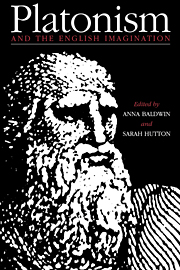Book contents
- Frontmatter
- Contents
- Notes on contributors
- Preface
- I ANTIQUITY
- II THE EARLY CHRISTIAN PERIOD AND THE MIDDLE AGES
- III THE RENAISSANCE AND THE SEVENTEENTH CENTURY
- IV THE EIGHTEENTH CENTURY
- V THE NINETEENTH CENTURY
- VI THE TWENTIETH CENTURY
- 24 Introduction
- 25 Yeats and Platonism
- 26 Virginia Woolf and Plato: the Platonic background of Jacob's Room
- 27 Plato and Eliot's earlier verse
- 28 The Cantos of Ezra Pound: ‘to build light’
- 29 Platonism in Auden
- 30 Platonism in Iris Murdoch
- Bibliography
- Index
28 - The Cantos of Ezra Pound: ‘to build light’
Published online by Cambridge University Press: 15 December 2009
- Frontmatter
- Contents
- Notes on contributors
- Preface
- I ANTIQUITY
- II THE EARLY CHRISTIAN PERIOD AND THE MIDDLE AGES
- III THE RENAISSANCE AND THE SEVENTEENTH CENTURY
- IV THE EIGHTEENTH CENTURY
- V THE NINETEENTH CENTURY
- VI THE TWENTIETH CENTURY
- 24 Introduction
- 25 Yeats and Platonism
- 26 Virginia Woolf and Plato: the Platonic background of Jacob's Room
- 27 Plato and Eliot's earlier verse
- 28 The Cantos of Ezra Pound: ‘to build light’
- 29 Platonism in Auden
- 30 Platonism in Iris Murdoch
- Bibliography
- Index
Summary
In Pound's Cantos, as in Platonism generally, the generative energy ofthe universe is conceived as germinal intelligence, as nous. The light of intelligence manifests itself in every living thing, thus, ‘oak leaf never plane leaf’ (87/573), and, ‘there is something intelligent in the cherry stone’ (113/788); thus ‘bull by the force that is in him – / not lord of it,/ mastered’ (113/789). But the workings of nous are most effectively grasped when the mind penetrates such particular manifestations and conceives its governing conceptions, the universal Ideas and all-shaping Forms. Then, more over, it becomes possible for the divine conceptions to enter into and to govern human existence and society.This is humanity's part in the making of the Cosmos, to realise the light of the divine intelligence in the form of the Republic, or the ‘paradiso terrestre’ as Pound preferred to call it.
The Cantos are one man's effort to conceive the governing ideas of the process of which we are part, so that we might participate in it more effectually. That is to say, The Cantos are not about the Platonic idea of nous, but are an attempt to practise it – to be, as Spinoza put it, a human mode of the divine intelligence. The poem is an attempt ‘To make Cosmos – To achieve the possible’ (116/795), and to do ‘our job’ which is, as Ocellus said, ‘to build light’ (98/684). The reader, it should be said, is necessarily involved in the work.
Platonism, in its Neoplatonic form, is referred to in The Cantos by way allusions to and citations of a dozen or so philosophers.
- Type
- Chapter
- Information
- Platonism and the English Imagination , pp. 308 - 318Publisher: Cambridge University PressPrint publication year: 1994



